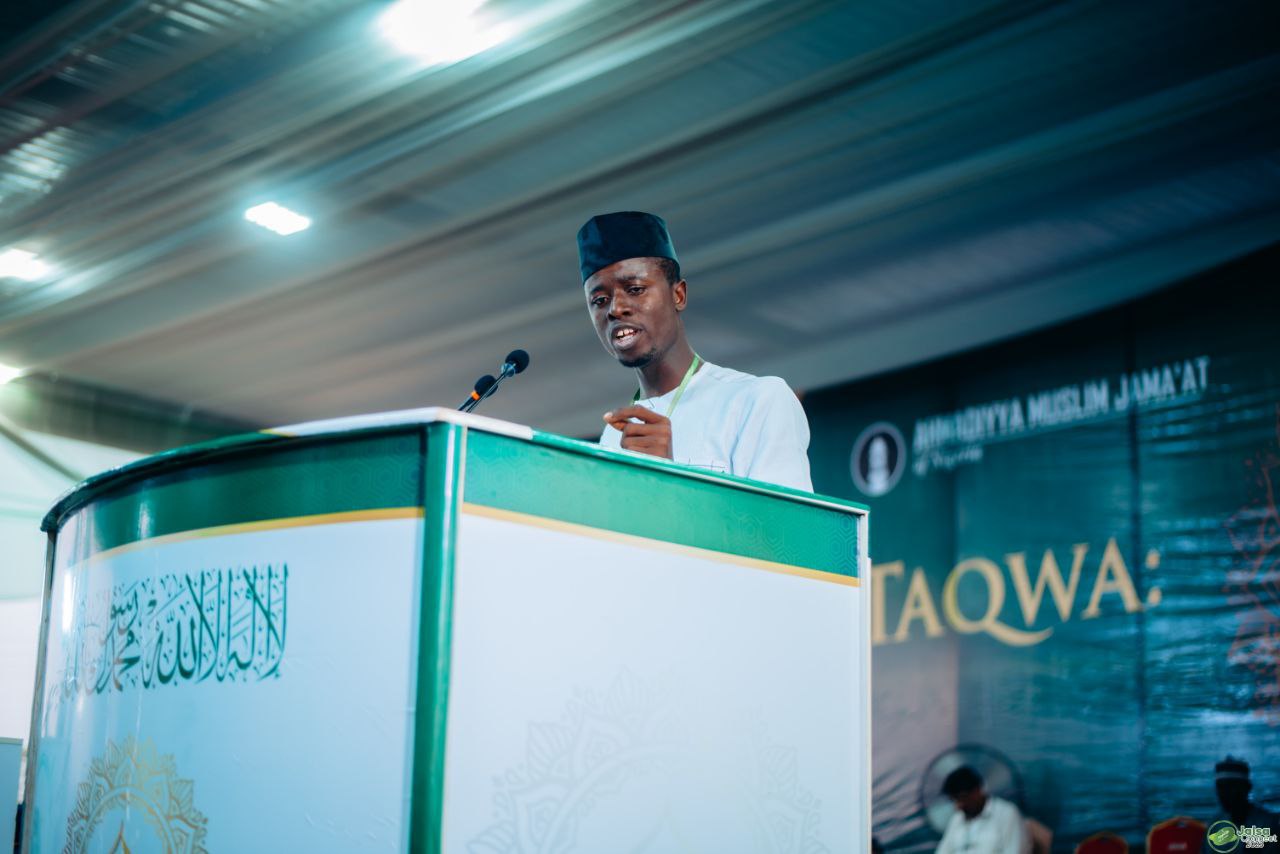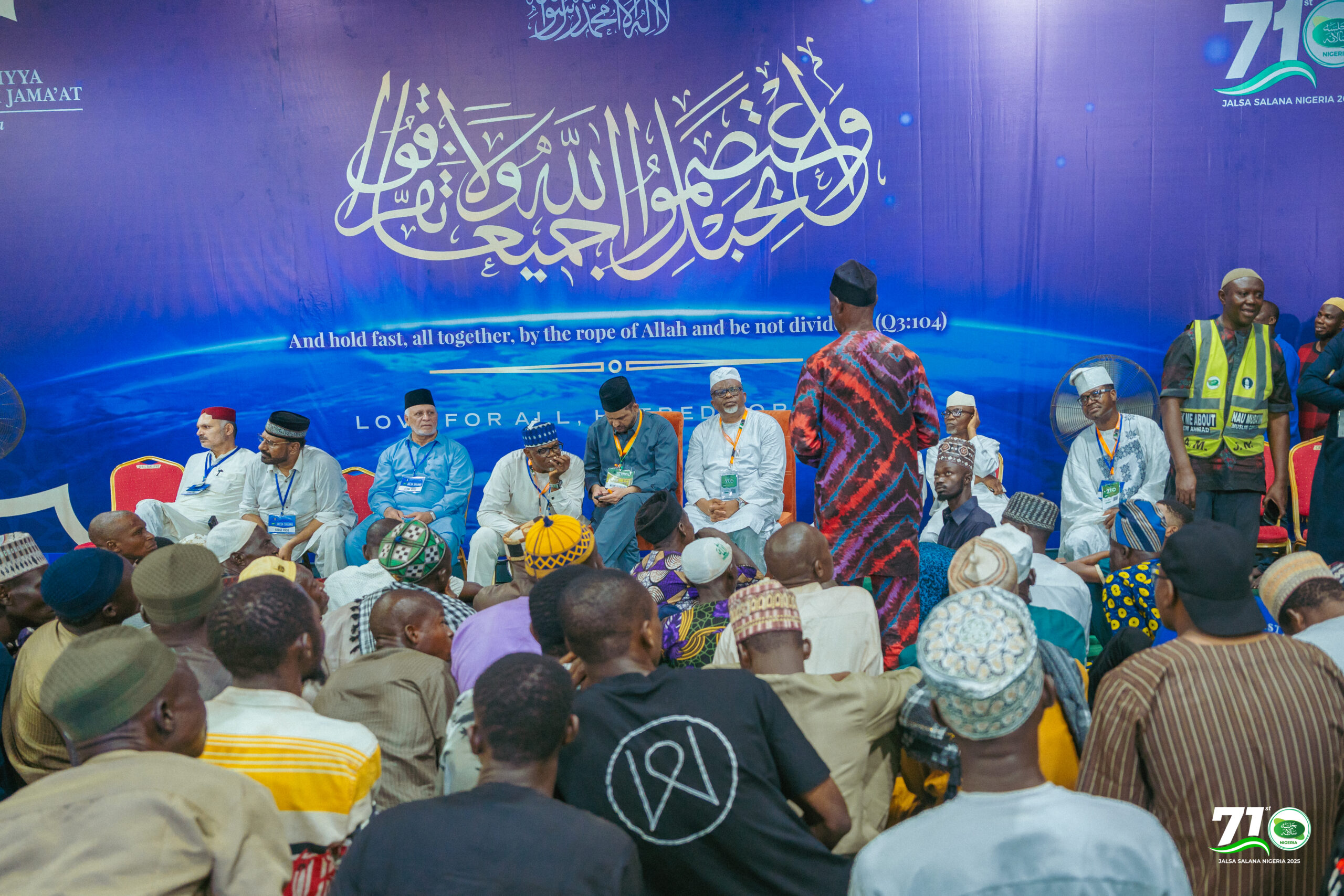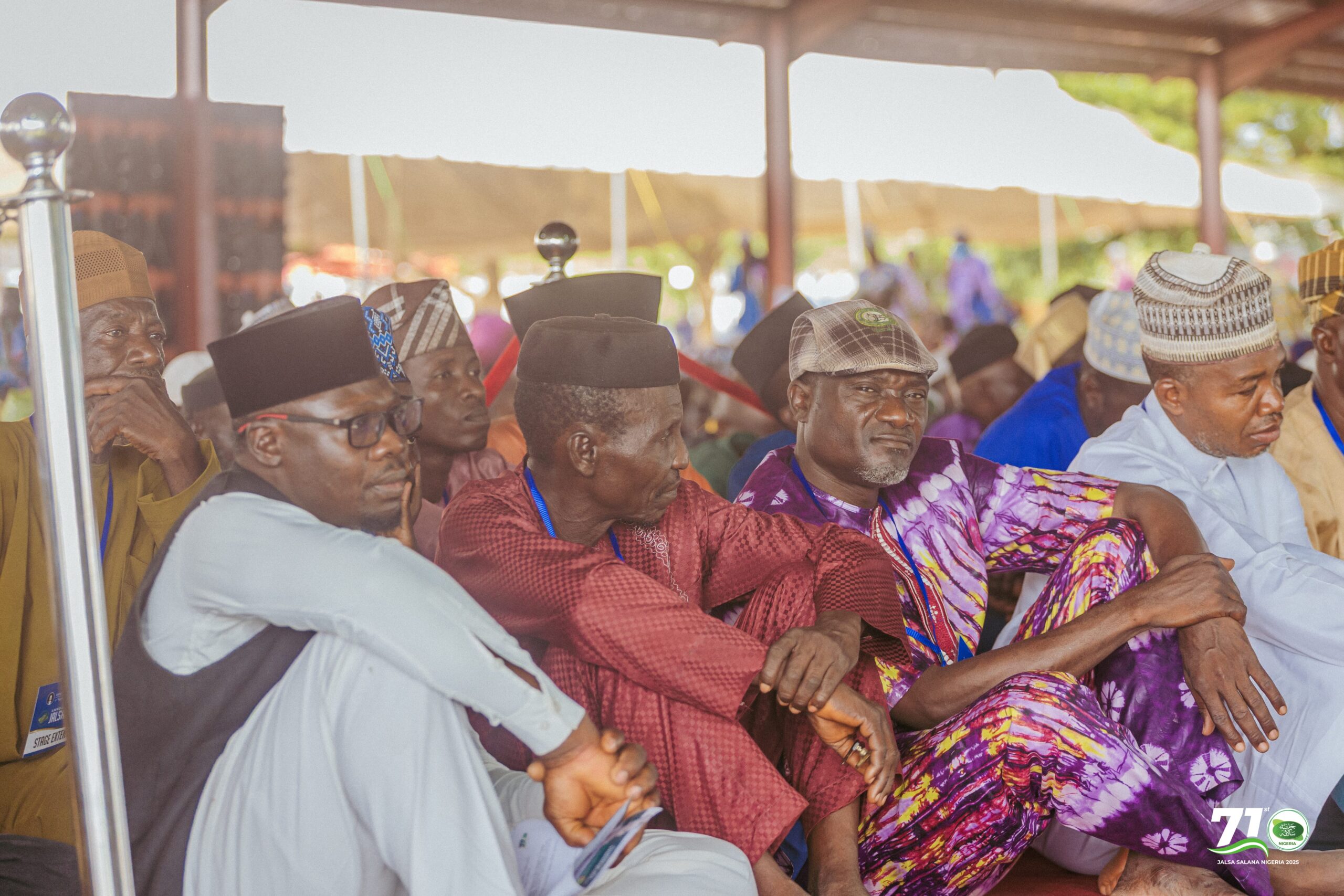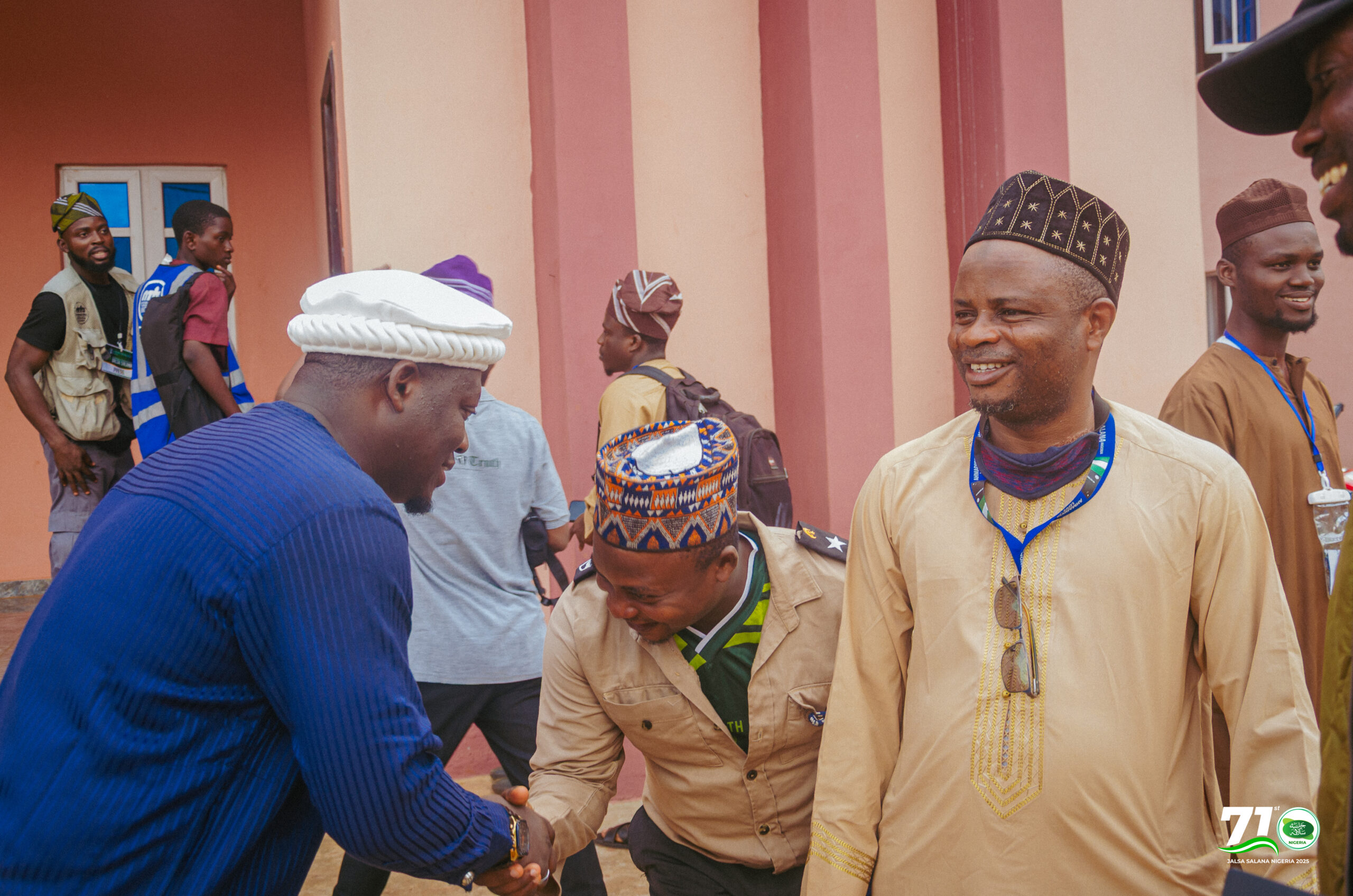By Maulvi Abdur Raheem Naeem-Ahmad
اشهد أن لا اله إلا الله وحده لا شريك له واشهد أن محمدا عبده و رسوله،أما بعد فاعوذ بلله من الشيطان الرجيم بسم الله الرحمان الرحيم
مَنْ عَمِلَ صَٰلِحًا مِّن ذَكَرٍ أَوْ أُنثَىٰ وَهُوَ مُؤْمِنٌ فَلَنُحْيِيَنَّهُۥ حَيَوٰةً طَيِّبَةً وَلَنَجْزِيَنَّهُمْ أَجْرَهُم بِأَحْسَنِ مَا كَانُوا۟ يَعْمَلُونَ
Whoso acts righteously, whether male or female, and is a believer, We will surely grant him a pure life; and We will surely bestow on such their reward according to the best of their works.
There have existed remarkable women with outstanding achievements in every part of the world at every point of time in history. However, most of their achievements were not recorded in history books. While just as brilliant, truthful, courageous and God-fearing as men, women in many societies have been valued less and often their contributions were discounted,or attributed to men. Notable exceptions were women produced by the religion Islam that were so extraordinary that their worth could not be ignored or minimized. The number of these women is so large that volumes upon volumes of books would need to be written to complete their accounts. Two of such women are Hadhrat Khadija (ra) and Hadhrat Nusrat Jahan Begum (ra)).
Respected Chairman, dear brothers and sisters,all our invited guests,the topic of my speech is Hadhrat Khadija and Hadhrat Nusrat Jahan Begum: Two pious ladies of great sacrifice.
I would like to draw your attention at the outset to one important advise of His Holiness (atba) in his concluding address at Lajna Imai’llah UK Ijtema 2022, Huzur says:
“Quite often, the examples of righteous people are narrated in our Jama’at programmes; they are not presented just as stories from the past to entertain us. Rather, the pious examples of our predecessors should guide and inspire us and our children to take up the mantle of being devoted servants of our faith. We learn from them what qualities and virtues Muslims should adopt so we can join the ranks of true believers.”
Dear audience ‘Behind every great man there’s a great woman’ was a proverb immortalised in the English language by a Texas newspaper in 1946, when it reported on the athlete, Meryll Frost. As Frost received a trophy he said, ‘Behind every great man there’s a woman. While I’m not a great man, there is a great woman behind me.’ (New York Times, November 1, 1946, Section Sports, Page 28)
Indeed, behind the greatest man that ever walked on the surface of the earth, Hadhrat Khaatama Nabiyyin, Muhammad Mustapha (sa) was a great woman whom without, the history of Islam would not be the same. That great woman is none other than Hadhrat Khadija al-Kubra (ra), the first and the most beloved wife of the Holy Prophet (sa).
No one can express in beautiful words the great sacrifice of this remarkable woman better than her husband, Muhammad Mustapha (sa), Hadhrat Aisha (ra) relates:
“Never did I feel jealous of the wives of the Messenger of Allah like I do in case of Khadija, although I did not have the privilege to see her. The Messenger of Allah (sa) used to praise Hadhrat Khadija (ra) most often and stressed her virtues and sacrifices that she had made for the cause of Islam. On one such occasion I could no longer control myself. I said to the Messenger of Allah (sa), O Messanger of Allah! Why do you talk so much of the old lady? God has given you better,younger and attractive wives. The Messenger of Allah was overcome by emotion when he heard this. He said said,Oh,No, Aisha! You have no idea how good Khadija was to me. She believed in me when the whole world refuted me and she attested to my veracity when the whole world accused me of falsehood. She offered me compassion and loyalty with her wealth when everyone else had forsaken me. O Aishah ! What can I do? Love for her runs in my blood and is nestled in my heart. (Musnad Ahmad,vol 6, page 117).”
Firstly, the marriage of Hadhrat Khadija (ra) to the Holy Prophet (sa) was indeed of a great sacrifice on her part. A distinguished, affluent and wealthy businesswoman who was a besought of several respected and influential men of Quraish chosed to marry Hadhrat Muhammad Mustapha (ra) who was a poor man, an orphan and a shepard just because of his noble character and stellar reputation. They were both married for approximately twenty five years. And inspite of the disparity between their economic position and age, as she was fifteen years older than the Holy Prophet at the time of their marriage (Al-Tabakatul Kubra Libni Sa’d, Vol.1, p.131-132; Seeratul Halabiyyah Vol.1, p.224.). The marriage proved to be extremely successful, the like of which history will never be able to produce.
Unlike majority of women, Hadhrat Khadija (ra) never used her status or wealth to bully or exert unduly dominion over the Hadhrat Muhammad Mustapha (saw),but instead humbly submitted herself to his authority and laid at his disposal all her wealth and riches. Hadhrat Musleh Maud (ra) writes:
“After her marriage with the holy prophet (sa), Hadhrat Khadija (ra) felt that she was rich and he was poor and that this inequality between them would not make for happiness,so she proposed to make over her property and her slaves to the holy prophet.” (Life of Muhammad,page 8.)
Allah the Almighty reminded the holy prophet (saw) of this favour when He says in Quran Chapter 93 vs 7
وَوَجَدَكَ عَآئِلًا فَأَغْنَى
And He found thee in want and enriched thee.
Ahmadi women should learn from Hadhrat Khadija (ra) that against the backdrop of general belief, a woman can be richer or have economic advantage over her husband and still yet enjoy a happy and successful marriage. All what is required is taqwa, obedience, submissiveness and respect for the husband. Many homes have broken and many relationships have hit bottom rocks as a result of wife being assertive in relationships because of her economic privilege over her husband.
Furthermore, Hazrat Khadijah (ra) was the first to believe in the Messenger of Allah (saw). Therein lay her principal virtue and merit and an attribute which the holy prophet (saw) always cherished. She would prove to be the Prophet’s steadfast ally at all times. it is narrated in Hadith that after the holy prophet (saw) received his first revelation in the cave Hira. He made his way home to Hadhrat Khadija (ra) trembling and asked her to cover him with a blanket. He was overwhelmed with anxiety and said. Khadija! What is happening to me? Fear of my life is beginning to overtake me. At this critical juncture. Hadhrat Khadija (ra) provided her husband with courage and solace by saying,
كلا وَاللَّهِ مَا يُخْزِيكَ اللَّهُ أَبَدًا، إِنَّكَ لَتَصِلُ الرَّحِمَ، وَتَحْمِلُ الْكَلَّ، وَتَكْسِبُ الْمَعْدُومَ، وَتَقْرِي الضَّيْفَ، وَتُعِينُ عَلَى نَوَائِبِ الْحَقِّ.
“Never! By Allah, Allah will never disgrace you. You keep good relations with your kith and kin, help the poor and the destitute, serve your guests generously and assist the deserving calamity-striken ones.” (Bukhari, Badaul Wahy.)
No one except Allah of course, knows more about a man than his wife, both his good and his bad qualities, his strengths and his weaknesses. Ibn Ishaq,a famous Muslim historian writes:
“Whenever the prophet (saw) would feel troubled by the accusations and abuse that were meted out against him by people, Hadhrat Khadija (ra) would reassure him,ally his troubles, lighten his burdens and ease his difficulties by her attestation and acceptance of his claim.” (Ibni Hisham, Vol.1, p.416.).
In her belief and support for the Holy Prophet (sa), not only did she have to watch the Prophet of Islam suffer and then suffer herself, but she also has to witness her children undergoing difficulties only because of their father was the true prophet of Allah. The disbelievers of Makkah wished to inflict as much pain upon the Holy Prophet (sa) as they could. Hence,they approached his two sons-in-laws,Utbah and Utaybah, sons of Abu Lahab; influenced them to divorce their wives, Hadhrat Ruqayah and Hadhrat Ummul Khulthum (ra). Both brothers divorced their wives. Thus Hadhrat Khadija (ra) had to endure the pains of two of her daughters being divorced simultaneously.
Dear audience! There’s a famous saying that Islam would not have spread if it was not for the wealth of Khadija. This is not an overstatement but rather a true fact. Firstly, it was after marrying Hadhrat Khadija (ra) that the Holy Prophet (sa) gained financial security. He now had time as he was free from the struggles of making a living. He had time to play more active role in the society and to reflect on the conditions of people and find solutions for their problems and social issues, as it has been generally the practice of the prophets of God. Earning a livelihood and worldly affairs require physical hard work while reflection requires mental exertion and puts a strain on mind. It’s well narrated in Hadith how the Messenger of Allah before his commission as a prophet would go in seclusion in the Cave Hira for days to worship Allah alone and reflect on the conditions of his people. Taking along with him some food and sometimes Hadhrat Khadija would herself provided him food at the Cave.
Secondly, after being commissioned as a prophet of God, this pious lady bequeathed all her wealth at the holy prophet’s (sa) disposal for the propagation of Islam. The majority of the early Muslims were weak and poor, in fact many were slaves. Hadhrat Mirza Bashir (ra) in his great work, Seera Khatama Nabiyyin writes:
” In any case, the outcome of the three to four year laborious endeavour of the Holy Prophet (sa) was merely these few souls. However, among these ancient pioneers, with the exception of Ḥaḍrat Abū Bakr (ra), there were none who possessed particular influence and honour among the Quraish. Some were slaves and most of the others were poor and weak. Some, however, were related to upper class families of the Quraish, but even among them, most were youngsters and thus, were not in a position to cast an influence in their tribes. Others who were aged had no influence due to their poverty or other reasons. For this reason, it was a common thought among the Quraish that only young and weak people had accepted Muḥammad (peace and blessings of Allāh be upon him). Therefore, after many years, when Heraclius, the King of Rome inquired of Abū Sufyān, the Chief of Makkah, “Does the nobility accept Muḥammad (peace and blessings of Allāh be upon him) or the weak lower class?” Abū Sufyān responded, “The weak and lower class accept him.” Upon which Heraclius answered – and beautifully indeed, “In the beginning, it is the lower class who accept the Messenger of God.”(Page 178).
Therefore, it was the wealth of Hadhrat Khadija (RA) that the Holy Prophet (sa) used to fed,clothe, sheltered those weak and poor early converts, and as well for procuring the freedom of some of the early Muslim slaves. The two feasts that the Holy Prophet (sa) arranged for his kinsmen who were more or less 40 people at a time in order to call them towards Islam wouldn’t have been financed by any other person except Hadhrat Khadija. The migration of the early Muslims to Abyssinian wouldn’t have been facilitated without the financial help of Hadhrat Khadija (sa).
Lastly, when the persecution of the Kuffar of Makkah yielded them no results, and they saw Islam spreading despite all of their efforts, they adopted the idea of boycotting the Muslims. The boycott lasted for three years. To read about the difficulties and hardships that the Muslims were compelled to bear makes the body tremble. Companions of the Holy Prophet (sa) narrate that sometimes, like animals, they survived by eating the leaves of wild trees. As far as the children were concerned, the sounds of their crying and screaming could be heard outside the encampment, and this would please the Quraish. (Seera Khatama Nabiyyin,page 231)
Although Hadhrat Khadija(ra) came from a noble and wealthy family, she chose to bear grief and pain for the cause of Allah and His Messanger. It was at that critical moment that Hadhrat Khadija depleted her entire fortune supporting the cause of Islam.
Sadly,few days after the demise of Abu Talib, the uncle of the holy prophet who has been his staunch supporter though not a Muslim, the soul of this great woman, Hadhrat Khadija (ra) rested with her Lord during the month of Ramadan, in 7th Nabawi (619 AD). The year is known in Islamic history as ‘Aamul Huzn i.e “The Year of Sorrow”. Her death appeared to the holy prophet (sa) like a mountain of sorrow, for his foremost supporter and partner in life has departed. May her soul continue to rest in perfect peace !
It has been observed these days that some of our members are not paying great attention to the payment of their monthly Chanda. and those that are paying are not paying the accurate prescribed rate. I wholeheartedly admit that things are very tough in the country . But at the same time the work of God should never and will never stop. Let us all take inspiration from the great sacrifice of Hadhrat Khadija for the cause of Islam, which as a result would grant us the nearness and pleasure of Allah the Almighty. Being pleased by Hadhrat Khadija’ timeless sacrifice, Allah conveyed His salam to her through Angel Jubril (as) and gave her the gladtidings of paradise.
The Promised Messiah (as) writes:
“Doomed are the people who spend hundreds for show and display,but when it comes to spending in the way of Allah,they will find all sorts of excuses. It is shameful indeed that a person should enter this Jama’at and not leave behind his miserliness and meaness. Allah has so ordained, that the party of His men always needs financial assistance.” (Majmua-e- Ishtiharat, Vol 3,page 156).
In this modern era, the sacrifice expected of us by Allah the Almighty has taken another dimension and it is now far beyond sacrificing our wealth and lives. Explaining what is it meant by sacrifice in this day and age, Hadhrat Khalifaful Masih V (atba) in his concluding address at lajna Imai’llah UK ijtema 2023 says:
Some may wonder what is meant by sacrifice in this day and age. It is quite simple: to act upon the commands of Allah the Almighty and the Holy Prophet (sa) at all times. It is to worship Allah five times a day at the appointed times. It is to study and ponder over the meaning of the Holy Qur’an and to act upon its commands. It is to train your children according to Islam’s teachings and instil Islamic values within them.
One pious woman who serves as our modern role model that encapsulates all the aspects of sacrifice required of us today is none other than Hadhrat Nusrat Jahan Begum, also famously known in the Jama’at as Hadhrat Amman Jan (literally mean respected and dear mother), the virtuous wife of the Promised Messiah (as). She’s the modern age Khadija for the entire Muslim Ummah. About her, God revealed to the Promised Messiah (as)
أشكر نعمتي رأيت خديجتي
Be grateful to Me that you have found my Khadijah
This reference to Hadhrat Nusrat Jahan Begum as “Khadijah”, the name of the first wife of the Holy Prophet Muhammad (sa
) indicates that there are similarities between these two great ladies.
It is interesting to note that both ladies were indeed married for approximately twenty five years to their spouses and bore 10 children each, (although not all survived to adult age.) Similarly, both this pious ladies because of their great sacrifices for the cause of Islam were both blessed with the glad tidings through their husbands, that they had an abode ready for them in Paradise.
The literal meaning of Hadhrat Nusrat Jahan Begum’s (ra) birth name is “Helper of the World”, this was to be a Divine intimation of the profound impact this pious lady was to have upon the world as the devoted life companion of our most recent prophet. She held esteemed positions within the Jamaat, being the wife of a Prophet of God, the mother of a Khalifa, grandmother of two Khulafa, and the great-grandmother of Hazrat Khalifatul Masih V(atba). She was a modern-day example of the spiritual, moral and personal excellence which can be achieved by following the commandments of the Holy Qur’an and by the blessings of Allah, the one God.
In the field of financial contributions, Hadhrat Nusrat Jahan Begum can be said to have surpassed all expectations. When we read about the sacrifices made by Ahmadis for the construction of Minarat-ul-Masih, Hadhrat Amma Jan’s(ra) name will always be remembered. In May 1900, when the Promised Messiah (as) announced that he needed a hundred people to donate one hundred rupees each to build Minaratul Masih in Qadian, a total of 10,000 Rupees, Hadhrat Amma Jaan (ra) responded by selling some property in Delhi and gave 1000 rupees. Thus donating one tenth of the entire cost. (Tarikh-e-Ahmadiyyat, Vol. 2, p. 117).
Hadhrat Amman Jan (ra) was always at the forefront when it came to donating money for any Jama’at appeal or project: these included mission houses, the “Langar Khanah” (community kitchen), Lajna projects, the London and Berlin Mosques and Tahrik-e-Jadid and lots more. She gave them priority over any personal desires. Hadhrat Musleh Maud (ra) has mentioned how his mother sacrificed all her personal desires. For example, he mentioned that when he had made an appeal for contributions for the Al-Fazl newspaper, Hadhrat Amman Jan (ra) sold some of her land for this cause and gave nearly 1000 rupees for it.
It was perhaps in tribute to Hadhrat Amman Jan‟s extensive financial sacrifices that the first mosque to be built in Scandinavia in Copenhagen, Denmark, was named the “Nusrat Jahan Mosque”. This mosque was purely funded by contributions from the Lajna Imaillah at the time. It was the third mosque in Europe to be financed by the ladies, partly inspired by the exemplary financial contributions Hadhrat Amman Jan (ra) had made throughout her life. It was also an acknowledgement of Hadhrat Amman Jan‟s lifelong commitment to serving humanity that Hadhrat Khalifatul Masih III (ra) was to name a pioneering scheme “The Nusrat Jahan Scheme” in 1970. By launching it, the Third Khalifa (ra) desired to open a substantial number of schools, hospitals, clinics and missions in Africa, particularly in West African countries.This scheme has been a source of enormous blessings for the continent of Africa.
Another great sacrifice of Hadhrat Nusrat Jahan Begum that cannot be overlooked is her extraordinary hospitality towards the guests of the Promised Messiah (as). Allah the Almighty revealed to the the Promised Messiah (as) that
يأتون من كل فج عميق و يأتيك من كل فج عميق،لا تصعر لخلق الله و لا تسئم من الناس
They will come by every distant track and will come to you from afar. Don’t turn away from God’s creatures with disdain and don’t get weary of people. (Lecture Ludhiana,page 5)
The Promised Messiah was instructed by God in another revelation
وسع مكانك يأتون من كل فج عميق
Enlarge your house; people will come to you from very distant land (Announcement of February 17, 1897, Majmu‘a-e-Ishtiharat, vol. 2, p. 327)
In fulfilment of this prophecy, visitors from distant parts of the world, Europe, America Asia etc used to come and stay with the Promised Messiah(as) who already have a very large household. It was Hadhrat Nusrat Jahan Begum (ra) that shared this huge responsibility of hospitality towards them. Hadhrat Mirza Bashir Ahmad(ra) her son relates that she was regularly busy cooking.
For us to catch a glimpse of how many guests that must have visited the Promised Messiah (as) during his life time, the Promised (as) Messiah in his book Fateh Islam written in 1891,writes :During the past seven years, a little over 60,000 guests must have come. (Victory of Islam, page 13)
One of the close acquaintances of Hadhrat Amman Jan (ra), Amatul Qayyum Sahibah relates,
“Like Hadhrat Masih-e-Mau’ud (as), Hadhrat Amman Jan (ra) also made alot of sacrifices – one was that she kept food prepared 24 hours a day for any guests that may come. Hudur would sometimes quickly request some “parathas” (butter flatbreads), tea, “lassi”(yoghurt drink) or curry to be brought in; sometimes pickles, chutney or milk,whatever a visitor may request. It seemed that inside it was like an “Aladdin’s Cave”, anything was available immediately. I have seen myself that Hadrat Amman Jan (ra) would not eat so much herself but was always much happier feeding others.” (Hadhrat Amman Jan ,page 54.
What is so remarkable about Hadhrat Nusrat Jahan Begum is that despite her every day household task of cooking, cleaning, washing and attending to the guests of the Promised Messiah (as), the true passion of her life was worship. She had the highest standards of worship and in this day and age is an excellent example for not only modern women but as well as men living in this materialistic world of ours.
It’s related that Hadhrat Amman Jan (ra) usually remained in a state of ablution in anticipation of the Call to Prayer and in the monthly days when she was not required to offer Salat,she would instead spend the time after the Adhan supplicating and remembering Allah. (Ibid, 38)
Hadhrat Amman Jan’s (ra) daughter Hadrat Nawwab Mubaraka Begum (ra) recalls how Hadhrat Amman Jan (ra) observed her prayers with great enthusiasm, conviction and passion. Not only were her prayers filled with fervent supplications but also the etiquettes of “Salat” were observed meticulously and with inspirational beauty. She further writes that she never recalls seeing her mother rush her prayers. (Ibid 36)
The greatest testimony to the weight and importance Hadhrat Amman Jan (ra) gave to the observance of prayers on time is Hadhrat Amman Jan’s astounding behaviour at the time of the death of her son “Bashir-e-Awwal”. Few mothers could even contemplate thinking of anything else but their child if he happened to be critically ill. Despite the fact that her son was critically ill and appearing to be breathing his last breath,when the time of prayer arose, Hadhrat Amman Jan (ra) did her ablutions and performed her prayers with perfect serenity, happy to be fulfilling Allah Almighty’s Commandments. She physically dissociated herself from the tense situation. After completing the prayers she enquired how her son was, to be told that the little one had taken his last breath. Hadhrat Amman Jan (ra) responded “Inna lillahi wa inna ilaihi rajiun “.After this she was silent. There was no wailing or weeping. There were no shrieks or lamentations of regret at the loss of her child, – a true indication that she was indeed one of Allah Almighty’s loyal servants. (Ibid 35).
On one occasion, a lady visited Hadhrat Amman Jan (ra) with her new born daughter. She relates that she waited some time until Hadhrat Amman Jan (ra) had completed her prayers. Hadhrat Amman Jan (ra) then enquired of the ladies visiting if they had offered their prayers. The lady with the child excused herself, explaining that her baby had wet herself and that she would go home and offer prayers after changing her. At this point, Hadhrat Amman Jan (ra) expressed some wise words. She said,”Never omit prayers using your children as an excuse. In this way, your children become a cause of Allah Almighty’s Wrath, when really, they are a reward from Allah Almighty.” (Ibid 39)
Her worship consisted of two elements; firstly, her strict adherence to the five daily prayers; and secondly the abundant recitation of the Holy Qur’an. Why not? The Promised Messiah (as) has unequivocally announced to the world that
الخير كله في القرآن
All goodness are in the holy quran
During illness and when her eyesight had diminished, Hadhrat Amman Jan (ra) would request someone to recite the Holy Qur’an to her. Whenever Hadhrat Amman Jan (ra) felt restless or burdened, she found solace in the Holy Qur’an. On one occasion,she said concerning “Surah Yasin”, that it should not be considered for one specific time only (as it is commonly recited near the time of death) but that it is a tonic to relieve one of pain and worries at any time. (Ibid 40)
Amazingly,her request one hour before her demise was “Recite the Holy Qur‟an to me”, (Ibid,41).
Hadhrat Amman Jan (ra) eagerly wished to instil the love of the Holy Qur’an in others. At weddings she would often give the bride a copy of the Holy Quran as a gift. Hadrat Amman Jan (ra) also loved to listen to commentaries of the Holy Qur’an and was eager for all Ahmadi ladies to study it. (Ibid 41).
Lastly, Hadhrat Amman Jan (ra) brought a revolutionary change in the way and manner of children upbringing. At the Indonesian Jalsa of July 2002, Hadrat Khalifatul Masih IV (ra) addressed the Lajna and said that a good method for the successful moral training of our children would be to follow the excellent example of Hadhrat Amman Jan (ra). He stated,”If you wish to save your children from evil influences then follow the pure example of Hadhrat Amman Jan (ra). This prescription is,without fail; and whoever follows it will be successful.”
In this speech the Fourth Khalifa (ra) mentioned the following salient points: he emphasised that Hadhrat Amman Jan (ra) firstly insisted that her children must never lie despite fearing the worst consequences. She taught that falsehood is indeed a form of “shirk” (idolatry), because the perpetrator does it out of fear of an individual or punishments, which they perceive as greater than Allah Almighty. Hudhur said that Hadhrat Amman Jan (ra) did not stress anything more in her children than “developing repulsion for lying”.
Secondly, like Hadhrat Amman Jan (ra) and the Promised Messiah (as) parents should ensure that their children feel that they have belief and confidence in them. This instils self-confidence and high self-esteem in them. Children believe that if their parents respect them so too will others.
Thirdly, Hadhrat Amman Jan (ra) emphasised the importance of prayer.She prayed continuously, day and night. Almost every utterance and action became a prayer on Hadhrat Amman Jan’s lips.For example,whilst eating with any of her grandchildren she would put a morsel of food in their mouth uttering, “Oh Allah Almighty make his/her fortune good.” Also, if one of the children was leaving the house Hadhrat Amman Jan (ra) would bid farewell with a prayer, “Go, and may Allah Almighty be your Protector and Helper.” She also instructed them to offer the greeting of “Salam” as they entered and left the house.
Fourthly, Hadhrat Amman Jan (ra) encouraged that the training of the eldest child was really important as younger children then followed the eldest and would easily adopt good habits.
There’s a very famous quotation from Napoleon Bonaparte, “Give me a good mother, and I shall give you a great nation!.”
At the end, we all stand together at our respective auxiliary meetings and functions to declare that we are ready to sacrifice our lives, property, time and children, this should resonate deeply within us. These pledges serve as a reminder of the great responsibility laid on us as Ahmadis especially women. The sacrifice of our women is more and highly paramount as Hadhrat Musleh Maud (ra) has succinctly said, without the sacrifice of women the sacrifice of men shall remain only in words. (Friday sermon ,23rd November 1934).
In one of his Friday Sermon, his Holiness (atba) said:
“We must never become negligent in our worship nor in our financial sacrifices nor in any commandments. Because a purposeful life is one is lived to attain nearness of Allah (Friday sermon 9th January 2009).”
And for us not to be negligent, Hadhrat Musleh Maud (ra) warned that,
“Biggest obstacle blocking the path to victory of any nation or community is if its members gain a lust for money and wealth. Such material cravings can easily corrupt people and weaken their resolve to offer sacrifices for their faith and to fulfil their religious objectives. Always remember, it is the promise of Allah the Almighty to the Promised Messiah (as) that our Jama’at will progress and prosper and that, Insha’Allah, one day, the Holy Prophet’s (sa) banner will be raised worldwide and the Oneness of God will be established with great majesty. The question is whether we will be amongst the fortunate souls who fulfilled their duties to this divine cause. If yes, we are among the fortunate ones.” (Concluding address,MKA UK Ijtema 2023).





